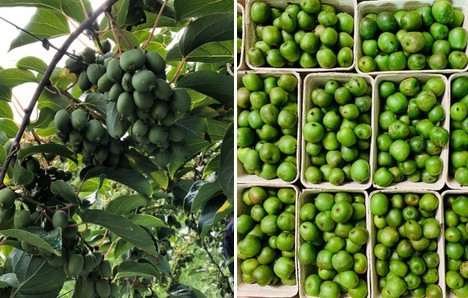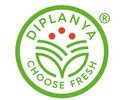Kiwi berries have been on the rise in the European trade for several years now. Until a few years ago the mini-kiwi was mainly imported from Southern Europe or overseas, but now the area under cultivation is growing rapidly in Germany. Further growth potential is clearly available, but the kiwi berry is particularly sensitive to frost. FreshPlaza.de spoke with several producers and traders.
Cultivation: Late frost destroyed the harvest
The Lake Constance district has always been considered the orchard of Germany: Every year, tons of pome, berry and stone fruit are produced in the deep south of the Federal Republic. Fruit farmer Heinz Martin from Eriskirch has expanded his production facility in recent years to include several tropical fruits - such as peaches, nectarines and aronia berries. "Four years ago we planted one hectare of kiwi berries and this year we could have harvested over ten tons. Then in May we had a cold spell and several frosty nights in a row: Our apricots and nectarines probably survived this late frost well, but our kiwi berries were almost completely frozen," says Martin, outlining the fruit's sensitivity to frost.
 Kiwi berries are now also cultivated on Lake Constance. The berry fruits are delivered directly to regional private buyers via 24-hour vending machines.
Kiwi berries are now also cultivated on Lake Constance. The berry fruits are delivered directly to regional private buyers via 24-hour vending machines.
Nevertheless, his customers - mainly private buyers, weekly market traders and farm stores - are enthusiastic about the eye-catching berry fruit. Martin: "As far as I know, we are still one of the few growers in the Lake Constance district. So that our customers can still enjoy kiwi berries, we have purchased some from a fruit grower in Austria who is a friend of ours and the feedback is consistently positive. The kiwi berries are also extremely lucrative in terms of price: "In private sales, the price per kilo fluctuates around 12-14 euros/kg."
Due to the high sales potential the innovative fruit farmer looks confidently into the future. "Next year we will grow the kiwi berries under frost protection irrigation, so that we avoid product loss as far as possible. Added to this is storage: the sales window for the kiwi berries lasts in principle only 6 to 8 weeks, from the beginning of September to the end of October at the latest. However, we are striving to extend the sales window with different ripening varieties and optimal storage."
 The kiwi berries of Diplanya LLC are predominantly offered on the market under the proven own brand Kiwi Bears.
The kiwi berries of Diplanya LLC are predominantly offered on the market under the proven own brand Kiwi Bears.
Marketing: Further growth potential available
At Diplanya LLC (formerly Marktvertrieb Schwerin LLC) in Duisburg, Portuguese offers determine the current offer. "On our German growing farm there was a 90 percent crop failure due to frost. Therefore we now have to resort to imported goods from Portugal. The first arrivals from our contract cultivation there arrived at the end of June, and we expect the last consignments to arrive next week," explains a buyer and seller from the company, which specializes in soft fruit.
Impressions from the kiwi berry plant of Diplanya in Jülich (Aachen) This year the late frost has hit the German kiwi berry cultivation extremely hard.
According to Diplanya, the kiwi berries are becoming more and more popular with German consumers. "Although consumption is not as high as for the classic berry fruits, we were nevertheless able to place several programs in the food retail trade this year as well. The demand is slowly increasing over the years and constant quantities are needed in the trade. In the meantime, kiwi berries have become not only a seasonal assortment of German discounters and supermarkets, but also an export article for the Czech and Slovak markets. Based on this, we undoubtedly see further marketing potential."
For more information:
Martin Obst GbR
Heinz und Alexander Martin
Wolfzennen 5
88097 Eriskirch
Tel: +49 1713048312
Fax: +49 (0) 7541 981888
Mail: [email protected]
Web: www.martin-obst.com
Diplanya GmbH
Paul-Rücker-Str. 6b
47059 Duisburg
Tel: 0049 (0) 203 / 99318-0
Fax: 0049 (0) 203 /310620
Email: [email protected]
www.diplanya.com
